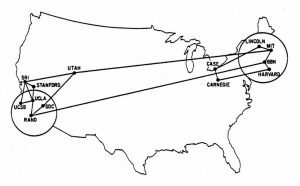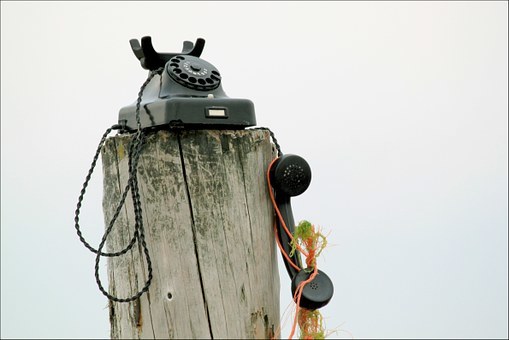5 Myths about Hosted VoIP Phone Service Debunked

When you hear VoIP, certain ideas about the technology crawl into your mind. It’s another one of those subjects that nearly everyone has an opinion about, without even necessarily knowing how they got there. If you’re one of the individuals who gets a bad taste in your mouth when you think of VoIP, you may want to think again.
- Isn’t VoIP a new technology? I’m going to hold off until “they” figure out all the bugs
VoIP has been around since 1973. This was when Network Voice Protocol was first invented for the ARPANET: The Advanced Research Projects Agency Network. The ARPANET was an early packet switching network and the first network to implement the protocol suite TCP/IP. Both technologies became the technical foundation of the Internet.

APANET 1973.
To the rest of us who weren’t involved in creating the Internet, VoIP may seem a lot newer because the public couldn’t easily get access to the technology until around 2004 when the first major companies appeared in the mainstream. Since then, VoIP services for the consumer has come a long way in terms of understanding how to appropriately implement it, but the core technology has remained pretty much the same. Any “bugs” that are still out there are more than likely due to a faulty configuration rather than the technology.
2. VoIP isn’t as reliable as normal phone lines. And what if my Internet goes down? I can’t take the risk.
To start off debunking this myth, think how your Internet is connected to your facility and how your phones lines are connected. When you get down to the basics, you’ll realize that for BOTH cases, it’s more or less physical cables connected within your building that run out underground and connect to larger cables which fast-track data where it needs to go. There are some exceptions to this of course, but people utilizing fiber, cable, or DSL will all have physical cables coming from somewhere exactly the same as your phone lines do.

Now let’s think about how an outage could occur. It could occur specifically to YOU, or it could occur to a lot of people all at once. For the former case, there would need to be some sort of interruption on the direct lines running out of your building. Considering you have a line for your Internet and a line for your phones, wouldn’t you agree that the odds of your Internet going down is the exact same as the odds of your phone lines going down? Phone lines aren’t inherently more durable; both are designed to be as strong as possible. So from this local perspective, phone lines are no more reliable than VoIP.
So what about an outage that would occur to a lot of people all at once? For the phones, this can occur if the main cable going into the phone company is compromised. This doesn’t happen frequently by any means, but it does happen. Customers can be without service for days at a time. And for Internet? Well the Internet works a little differently. There is no single main cable for the Internet that feeds into a service center. If a line gets severed somewhere, your data is automatically rerouted. When a website can’t be reached, it’s not because the Internet is down, but because specific servers somewhere are. So from this broad perspective, the Internet is actually MORE reliable than normal phone lines.
Now you may be asking yourself, “Well why does it always feel like the Internet isn’t working or that it’s running very slowly?” These problems are more likely the case that your bandwidth is saturated or your PC is having trouble getting a good signal. There are many, many reasons that could be the issue. Regardless of the cause, your VoIP phone service would unlikely be affected because of configuration to prioritize voice data and its direct line connection with the router.
Even if your Internet does go down locally, configuration is now smart enough that incoming calls can be routed to your cell phones without skipping a beat. With personal phones as ubiquitous as they are in the modern world, there shouldn’t ever be an issue.
3. VoIP doesn’t have the same quality as normal telephone lines. The call always breaks up or there’s an echo.
Call quality is definitely something you have the right to care about. And with VoIP service there are certain situations in which quality can diminish. However, this nearly always comes back to configuration error. VoIP technology makes HD voice possible in a way that an analog line can’t and can offer more than 8 times the sound quality. Many customers are often blown away when they make their first phone call using HD voice on a properly configured network. People typically comment that it sounds like the other person is in the same room as them.

Now let’s think about how an outage could occur. It could occur specifically to YOU, or it could occur to a lot of people all at once. For the former case, there would need to be some sort of interruption on the direct lines running out of your building. Considering you have a line for your Internet and a line for your phones, wouldn’t you agree that the odds of your Internet going down is the exact same as the odds of your phone lines going down? Phone lines aren’t inherently more durable; both are designed to be as strong as possible. So from this local perspective, phone lines are no more reliable than VoIP.
So what about an outage that would occur to a lot of people all at once? For the phones, this can occur if the main cable going into the phone company is compromised. This doesn’t happen frequently by any means, but it does happen. Customers can be without service for days at a time. And for Internet? Well the Internet works a little differently. There is no single main cable for the Internet that feeds into a service center. If a line gets severed somewhere, your data is automatically rerouted. When a website can’t be reached, it’s not because the Internet is down, but because specific servers somewhere are. So from this broad perspective, the Internet is actually MORE reliable than normal phone lines.
Now you may be asking yourself, “Well why does it always feel like the Internet isn’t working or that it’s running very slowly?” These problems are more likely the case that your bandwidth is saturated or your PC is having trouble getting a good signal. There are many, many reasons that could be the issue. Regardless of the cause, your VoIP phone service would unlikely be affected because of configuration to prioritize voice data and its direct line connection with the router.
Even if your Internet does go down locally, configuration is now smart enough that incoming calls can be routed to your cell phones without skipping a beat. With personal phones as ubiquitous as they are in the modern world, there shouldn’t ever be an issue.
4. VoIP doesn’t have the same quality as normal telephone lines. The call always breaks up or there’s an echo.
Call quality is definitely something you have the right to care about. And with VoIP service there are certain situations in which quality can diminish. However, this nearly always comes back to configuration error. VoIP technology makes HD voice possible in a way that an analog line can’t and can offer more than 8 times the sound quality. Many customers are often blown away when they make their first phone call using HD voice on a properly configured network. People typically comment that it sounds like the other person is in the same room as them.

A good VoIP provider will ensure quality of service during and after installation, as well as provide a method to properly monitor it. By taking a proactive approach, any potential issues that could arise can be accounted for and mitigated in extenuating circumstances.
5. With a hosted phone system, I don’t have the same level of control. I want to make changes at my own leisure.
So go ahead and make those changes! It’s a misconception that hosted systems take away control over how your organization wants to configure its phone network. There are some companies that may choose to retain this control, but many hosted system providers create easy ways for you to do it yourself. In fact, there is great incentive for them to do this as it puts less work for them in terms of needing personnel to take your call, try to interpret what you want, and make the desired changes. Alterations and additions to your network is done by your hand at the click of a mouse.
6. That all sounds great, but we all know that anything over the Internet isn’t secure. I’m opening myself up to hackers by choosing a VoIP system.
The Internet has its weak points. That much has been proven time and time again. But ask yourself, do you use online banking? I would hazard a guess that you do. As the Internet has matured, its security has gotten strong enough to the point where the mass majority of people are comfortable putting very sensitive information online now. Voice data over the Internet is no different. Good service providers encrypt your call data in the same way a bank would encrypt your account numbers and additionally sets up secure measures so only you can access your account.
Don't let a fear of the unknown hold you back. Find out more about modern VoIP solutions and bring your business into the future!
NocTel Communications is a hosted VoIP provider dedicated to solving the many communication problems that organizations face today. Known for providing the highest quality service at a fraction of the price of its competitors, NocTel is completely disrupting the telecommunications industry.